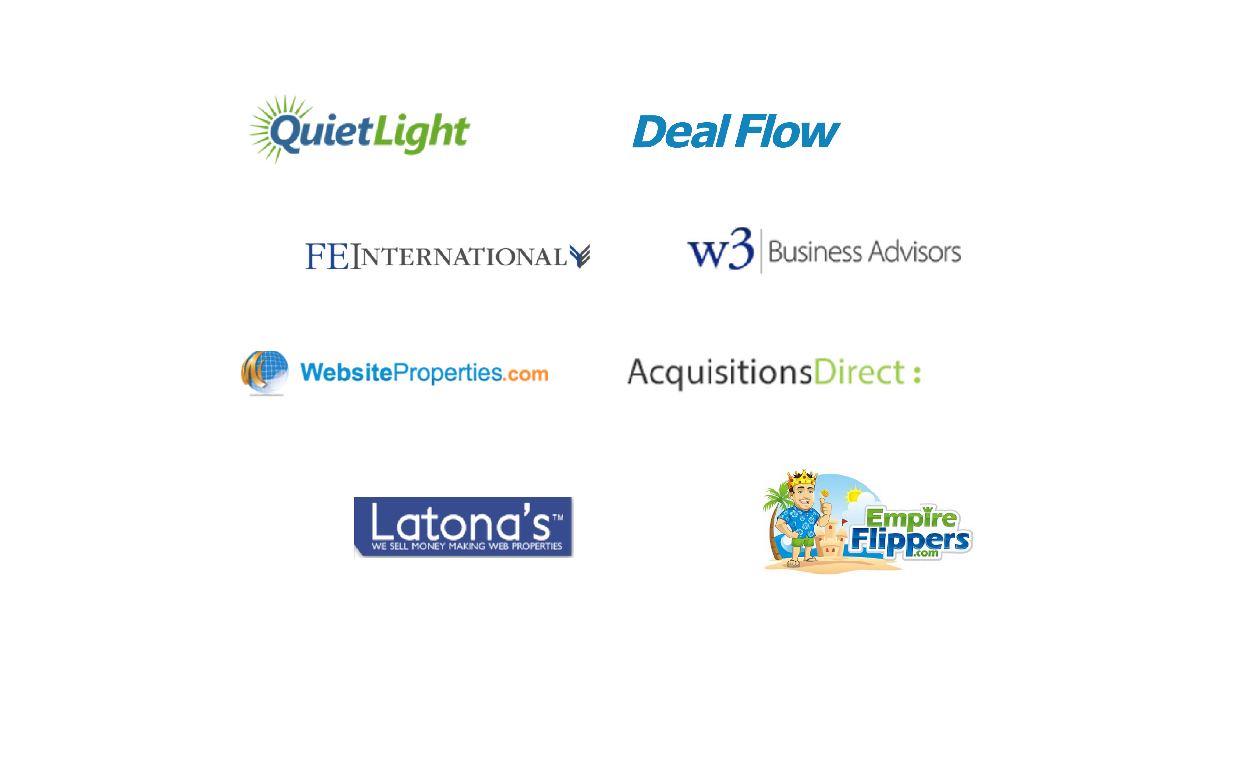How to Tell a Legitimate Website Broker from a Scam Artist
Over the last couple of years, the website brokerage scene has changed enormously.
In 2011, there were a total of 5-6 brokerages, all of them more or less reputable and honest. Today, there are over 20 businesses and individuals calling themselves website brokers or online business brokers – some of them are worth to deal with, while others are straight up scam artists.
For someone looking to purchase (or sell) a web property it is naturally difficult to distinguish between legitimate operations and scam artists.
As someone who has worked closely with nearly all brokers, I’ll give you a set of tips that should help you identify brokers worth dealing with from those who are likely to sell you a dud in the interest of quick profit, costing you tens or hundreds of thousands of dollars or pounds.
Background Search
The first step you need to take is conduct a quick background search on the brokerage that you’re about to deal with. Similarly to how you wouldn’t buy a second hand car from an underground dealership, operating out of a small garage in the dodgy part of the town, you don’t want to make a high-dollar website acquisition through a brokerage that isn’t reputable.
There are several ways to look up the background of the company – with the easiest being a quick Google search. Typing the name of the brokerage into Google (surround it with quotation marks to get more relevant results!) and going through the first 5-10 pages of results often gives you a bunch of valuable information. Always look beyond the first page of results, though. Many companies and individuals perform high-scale SEO campaigns to make sure that the first page of Google’s results is favourable for them, while few pay attention to the remainder of results.
Be extremely cautious in cases where the Google search doesn’t result in much information, as odds are that you’re dealing with someone who has started only recently, or is deliberately avoiding publicity. Also be on the lookout for any negative comments left by others, and remember that even though 1 or 2 negative reports is a small sample, most people tend to not publish their experiences online and as such, even 2 scam reports often means that there are far more than 2 people dissatisfied with the service, but the majority just haven’t spoken up.
It is equally important to background search the broker that you’re in touch with, not only the firm. Again, use quotation marks to Google for the broker’s name to avoid getting a lot of irrelevant results.
How long has the brokerage been around for
While I’m not implying that a new operation can’t be trustworthy, it’s typically advisable to stick to brokerages that have already established their place in the industry and can therefore be relied upon.
Another important aspect to look at is whether the brokerage in question is lying about their history. I recently encountered a brokerage who have gone around claiming that they are “one of the earliest companies to sell businesses online” – while interestingly, the first time I heard of them was around 6 months ago, their “lead broker” appears to have no prior brokerage experience, and according to Archive.org, their website has been up and running for less than a year.
Naturally, you don’t want to do business with a company that thinks it’s OK to lie straight to their client’s face.
Where are they based?
Again, a location alone isn’t an indication of whether a broker is trustworthy or not, but it IS a major consideration should anything go wrong and legal action be necessary.
That’s because inter-jurisdiction lawsuits are typically extremely expensive, and often nearly impossible to go through, due to the differences in countries’ legislative frameworks.
Because of this, it is always a good idea to stick to working with brokerages that operate out of Western countries. At least you can rest assured that, should anything go wrong, you can speak to an attorney and possibly file a lawsuit, without having the legal expenses exceed the amount of money that you’re trying to recoup in the first place.
Are they happy to let you conduct independent due diligence?
My experience at Centurica tells me that the vast majority of reputable brokerage firms, such as FE International, Quiet Light Brokerage, Acquisitions Direct and others are more than happy to work with us on due diligence, introduce us to the seller and allow us to gather all of the information and proofs that we require to conduct our due diligence.
This is mainly because they have nothing to hide, and in cases where they have listed a sub-par or potentially fraudulent property, they would rather hear it from us and forgo their commission than to go through with the sale and as a result, lose a client for life and risk with possible legal actions taken against them.
Some other brokers, on the other hand, are the exact opposite. I’ve had a broker tell my client specifically that they “do not work with third party due diligence agencies”. Naturally, this instantly raises several red flags:
1) These brokers often claim that they conduct their own due diligence, which should be sufficient to the buyer. Naturally, this isn’t the case at all as brokers get paid only upon a completion of a deal, meaning that it is in the broker’s direct interest that the deal goes through, resulting in a major conflict of interests.
2) It is actually in the broker’s best interests to have a third party agency complete due diligence for their listings, rather than have the buyer do it on their own, as in most cases the process is quicker and better planned when done by a professional agency, resulting in less misunderstandings and delays. Because of this you need to be extremely cautious with brokers who are hesitant to work with due diligence agencies, as more often than not, its because they have something to hide.
3) Not letting a client conduct due diligence is often due to the broker wanting to complete the deal in an unhealthy time frame and trying to avoid the short delay that due diligence carries. Needless to say, acquisitions that happen in a matter of days are ALWAYS risky (more on this below) and therefore extreme caution is recommended in cases where a broker tries to rush a deal.
To reiterate – you should ALWAYS avoid any brokers who claim that they have “performed all of the necessary due diligence themselves”. Always remember that a broker represents the seller (not you), and only gets paid for deals that end up going through.
Is it a one-man-show or an actual firm?
Another important consideration is whether you’re dealing with an actual firm who have a qualified team in place, or a one-man-band posing as a brokerage firm.
Similarly to age and location, the fact that there is only one person working for the firm alone isn’t necessarily an issue, but it does present a number of risks, namely:
1) Owner-operated businesses are always more likely to “disappear” than established firms with employees. Should this happen, you will often be left with no post-sale assistance and no way to hold the broker responsible should a deal go wrong.
2) Not having an established team often means that the company doesn’t hold a whole lot of assets, either. Because of this, you may find yourself in a situation where you take legal action against the brokerage, go through all of the proceedings and win the case, only to discover that the firm has no assets to cover your claim.
Do they have clear contact details available on their website?
Always be very cautious when dealing with companies that don’t display their contact details on their website, and only have a contact form and/or an email address available.
All reputable brokerage firms that I can think of have not only their contact details (address, phone number) available on their website, but also a list of their staff/brokers, allowing you to properly research them and to know whom you’re dealing with.
Secrecy is always a horrible sign, and often indicates that there is something to hide.
Can you speak to them on the phone?
It’s important to keep in mind that every reputable broker should be available for a phone call with you to discuss the opportunity that you’re interested in and allow you to ask them questions about their firm.
During my 4 years in the industry, I’m yet to encounter a non-fraudulent broker making excuses not to have a phone conversation and insisting on keeping the conversation to email and/or Skype.
Whilst I always recommend to jump on a call with your broker, it’s also important to keep all of the deal-specific communication to email, especially if it contains claims or promises, as should anything go wrong – the “paper trail” that an email conversation leaves will often turn out to be the sole deciding factor in whether you have a case or not.
Is the broker rushing the deal (particularly in the due diligence phase)?
Last but not least, you should always be EXTREMELY cautious with brokers who appear to be rushing a deal. It isn’t unheard of that brokers present their clients with ultimatums, such as “you need to close it in 2 days’ time or someone else will”. Whilst it could in fact be true that the broker has other interested parties, especially with the demand exceeding the supply by far in the current market climate, rushing a deal through is extremely bad business practice and should immediately raise a truck load of red flags.
I’m not by any means suggesting you to delay the acquisition process, but you shouldn’t give in for ultimatums. When putting in an offer, make sure that you have agreed on the expected time frame beforehand, and that both yourself, the broker, and the seller are happy and comfortable with it.
The Future
My personal prediction is that in a few years time the number of fraudulent brokers will naturally decrease, as the industry grows out of its infancy and buyers become better educated. But until then it pays to be cautious, even if it means losing out on some seemingly fantastic opportunities.
Let us know in comments below about your negative (and by all means – positive) experiences with website brokers, and whether you have any tips in addition to the ones listed above!








